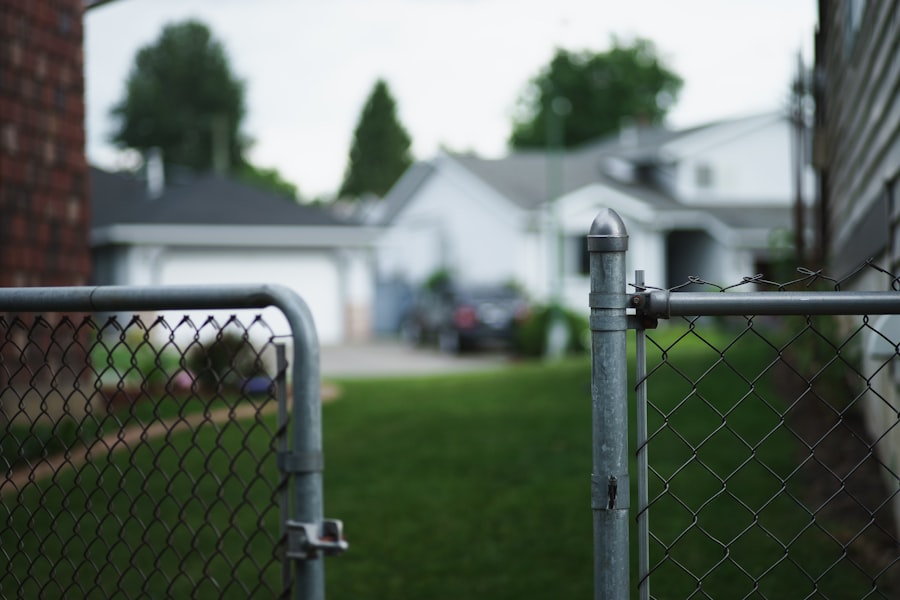Chickens are naturally curious and social animals with a strong foraging instinct. They are easily startled and can be skittish around unfamiliar objects or predators. Understanding these behaviors is essential for implementing effective deterrent strategies.
Chickens possess a strong sense of smell and are sensitive to certain scents. They have keen eyesight and are attracted to bright colors and movement. These characteristics can be exploited to create natural deterrents, repellent scents, and visual distractions to keep chickens away from undesired areas.
As creatures of habit, chickens can be trained to avoid certain areas or behaviors through consistent reinforcement. Utilizing positive and negative reinforcement techniques can effectively teach chickens to stay away from specific areas or activities. This knowledge can be applied to create physical barriers, provide alternative food sources, and implement visual deterrents to discourage unwanted behaviors or presence in particular areas.
Table of Contents
- 1 Creating Physical Barriers
- 2 Using Natural Deterrents
- 3 Implementing Repellent Scents
- 4 Providing Alternative Sources of Food
- 5 Utilizing Visual Distractions
- 6 Monitoring and Training the Chickens
- 7 FAQs
- 7.1 What are some effective ways to keep chickens out of the vegetable garden?
- 7.2 What type of fencing is best for keeping chickens out of the vegetable garden?
- 7.3 What are some natural deterrents that can be used to keep chickens out of the vegetable garden?
- 7.4 How can physical barriers be used to keep chickens out of the vegetable garden?
- 7.5 Why is it important to keep chickens out of the vegetable garden?
Key Takeaways
- Chickens are naturally curious and will explore their environment, including areas they are not supposed to be in.
- Physical barriers such as fences and netting can effectively keep chickens out of unwanted areas.
- Natural deterrents like predator urine or hot pepper spray can discourage chickens from entering certain areas.
- Repellent scents such as citrus or mint can be used to keep chickens away from specific locations.
- Providing alternative sources of food and entertainment can distract chickens from areas they are not supposed to be in.
- Visual distractions such as shiny objects or scarecrows can help deter chickens from entering restricted areas.
- Regular monitoring and training can help reinforce boundaries and discourage chickens from straying into unwanted areas.
Creating Physical Barriers
Fencing as a Physical Barrier
Fencing is a common and effective method for creating physical barriers to keep chickens out of certain areas. Chicken wire or hardware cloth can be used to create a barrier around garden beds or other vulnerable areas. Additionally, using netting or mesh can protect plants and structures from being damaged by chickens.
Structures as Physical Barriers
Another method for creating physical barriers is by using structures such as raised garden beds or chicken coops to protect plants and structures from chickens. Raised garden beds can be elevated off the ground to prevent chickens from foraging in the soil and damaging crops. Chicken coops can also be used to confine chickens to a specific area, preventing them from accessing vulnerable plants or structures.
Effective Protection with Physical Barriers
By creating physical barriers, you can effectively protect plants and structures from damage caused by chickens. By blocking off access to specific areas or protecting plants and structures, you can prevent chickens from causing damage or disruption.
Using Natural Deterrents

In addition to physical barriers, natural deterrents can be used to keep chickens away from certain areas or activities. Natural deterrents take advantage of chickens’ natural instincts and senses to discourage them from accessing specific areas. This can include using plants, predators, or other natural elements to deter chickens from unwanted areas.
Plants with strong scents or prickly textures can be used as natural deterrents to keep chickens away from specific areas. For example, planting herbs such as rosemary, lavender, or mint around garden beds can deter chickens with their strong scents. Additionally, plants with prickly textures such as thorny bushes or cacti can discourage chickens from foraging in certain areas.
By using natural deterrents, you can effectively keep chickens away from vulnerable plants and structures. Predators can also be used as natural deterrents to keep chickens away from specific areas. Placing decoy predators such as fake owls or hawks in garden beds or other vulnerable areas can deter chickens by triggering their instinctual fear of predators.
Additionally, allowing natural predators such as cats or dogs to roam the area can help keep chickens away from unwanted areas. By using natural deterrents such as plants and predators, you can effectively discourage chickens from accessing specific areas.
Implementing Repellent Scents
Another effective method for deterring chickens is by implementing repellent scents that are unpleasant to them. Chickens have a strong sense of smell and are sensitive to certain scents, which can be used to discourage them from accessing specific areas or engaging in certain behaviors. By utilizing repellent scents, you can effectively deter chickens from unwanted areas or activities.
Citrus scents such as lemon or orange can be used as natural repellents to keep chickens away from specific areas. Spraying citrus-scented water around garden beds or other vulnerable areas can deter chickens with its unpleasant smell. Additionally, using vinegar or hot pepper spray can also be effective in repelling chickens due to their strong and unpleasant scents.
By implementing repellent scents, you can effectively discourage chickens from accessing specific areas. Another method for implementing repellent scents is by using essential oils such as peppermint or eucalyptus to deter chickens. These strong-smelling oils can be diluted with water and sprayed around garden beds or other vulnerable areas to keep chickens away.
Additionally, using garlic or onion scents can also be effective in repelling chickens due to their pungent odors. By implementing repellent scents, you can effectively deter chickens from accessing specific areas or engaging in unwanted behaviors.
Providing Alternative Sources of Food
One effective way to deter chickens from unwanted areas is by providing alternative sources of food that will distract them from vulnerable plants or structures. Chickens are naturally inclined to forage for food, so by providing alternative sources of food, you can redirect their attention away from specific areas where they may cause damage or disruption. One method for providing alternative sources of food is by offering a designated foraging area where chickens can access insects, seeds, and other natural food sources.
By creating a designated foraging area with loose soil or mulch, you can encourage chickens to forage in a specific area rather than in garden beds or other vulnerable areas. Additionally, scattering scratch grains or mealworms in the designated foraging area can further entice chickens to forage in that specific location. Another method for providing alternative sources of food is by offering supplemental feed in a separate feeding area away from vulnerable plants or structures.
By providing a consistent source of supplemental feed such as grains or pellets in a designated feeding area, you can redirect the attention of chickens away from garden beds or other vulnerable areas. Additionally, offering treats such as fruits or vegetables in the designated feeding area can further distract chickens from accessing unwanted areas.
Utilizing Visual Distractions

Redirecting Attention with Shiny Objects
Chickens are attracted to bright colors and movement, making visual distractions an effective way to redirect their attention away from specific areas where they may cause damage or disruption. One method is to hang shiny objects such as CDs or aluminum foil strips around garden beds or other vulnerable areas. The reflective surfaces of these objects will catch the sunlight and create movement, which will deter chickens with their unfamiliar and potentially threatening appearance.
Scarecrows and Intimidating Objects
Using scarecrows or other visually intimidating objects can also be effective in deterring chickens by triggering their instinctual fear response. These objects can be placed around garden beds or other areas where chickens are not wanted, providing an additional layer of protection.
Visual Barriers with Plants and Colors
Another method for utilizing visual distractions is by planting tall grasses or shrubs around garden beds or other vulnerable areas to create visual barriers that will deter chickens. The dense foliage of these plants will obstruct the line of sight for chickens and create a physical barrier that will discourage them from accessing specific areas. Additionally, using brightly colored flags or ribbons around garden beds can create visual barriers that will deter chickens with their unfamiliar appearance.
Monitoring and Training the Chickens
Finally, monitoring and training the chickens is essential for maintaining effective deterrent strategies. By consistently observing the behavior of the chickens and providing consistent reinforcement, you can train them to avoid certain areas or activities through positive and negative reinforcement techniques. Monitoring the behavior of the chickens will allow you to identify any weaknesses in your deterrent strategies and make necessary adjustments to effectively deter them from unwanted areas or activities.
By consistently observing their behavior and making adjustments as needed, you can ensure that your deterrent strategies remain effective over time. Training the chickens through consistent reinforcement techniques such as rewards for desired behaviors and deterrents for unwanted behaviors will help them learn to avoid certain areas or activities. By providing consistent reinforcement and being patient with the training process, you can effectively train the chickens to stay away from specific areas or engage in certain behaviors.
In conclusion, understanding the behavior of chickens is essential for implementing effective deterrent strategies. By creating physical barriers, using natural deterrents, implementing repellent scents, providing alternative sources of food, utilizing visual distractions, and monitoring and training the chickens, you can effectively deter them from unwanted areas or activities while maintaining a harmonious environment for both the chickens and your property.
If you’re looking for more tips on keeping chickens, you might be interested in an article on turning a shed into a chicken coop. This article provides valuable information on how to convert a shed into a suitable living space for your chickens, ensuring they have a safe and comfortable environment. Check it out here.
FAQs
What are some effective ways to keep chickens out of the vegetable garden?
Some effective ways to keep chickens out of the vegetable garden include using fencing, creating physical barriers, using natural deterrents such as plants with strong scents, and providing alternative areas for the chickens to forage.
What type of fencing is best for keeping chickens out of the vegetable garden?
A sturdy wire or mesh fencing that is at least 4 feet tall and buried a few inches into the ground is best for keeping chickens out of the vegetable garden. This type of fencing will prevent the chickens from digging under or flying over it.
What are some natural deterrents that can be used to keep chickens out of the vegetable garden?
Plants with strong scents such as lavender, rosemary, and mint can act as natural deterrents to keep chickens out of the vegetable garden. Chickens tend to avoid areas with strong smells, so planting these types of herbs around the garden can help deter them.
How can physical barriers be used to keep chickens out of the vegetable garden?
Physical barriers such as low fences, chicken wire cloches, or row covers can be used to physically block chickens from accessing the vegetable garden. These barriers can be temporary or permanent, depending on the specific needs of the garden.
Why is it important to keep chickens out of the vegetable garden?
It is important to keep chickens out of the vegetable garden to prevent them from damaging the plants, digging up the soil, and spreading diseases. Additionally, keeping chickens out of the garden helps maintain a clean and organized growing space for the vegetables.
Meet Walter, the feathered-friend fanatic of Florida! Nestled in the sunshine state, Walter struts through life with his feathered companions, clucking his way to happiness. With a coop that’s fancier than a five-star hotel, he’s the Don Juan of the chicken world. When he’s not teaching his hens to do the cha-cha, you’ll find him in a heated debate with his prized rooster, Sir Clucks-a-Lot. Walter’s poultry passion is no yolk; he’s the sunny-side-up guy you never knew you needed in your flock of friends!







